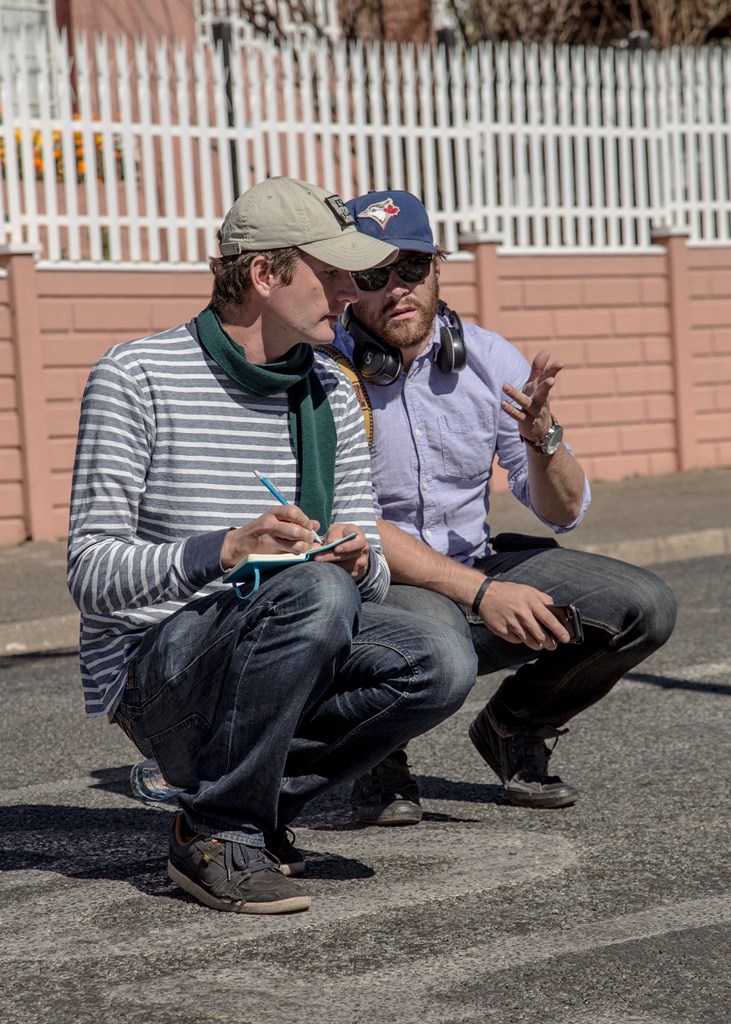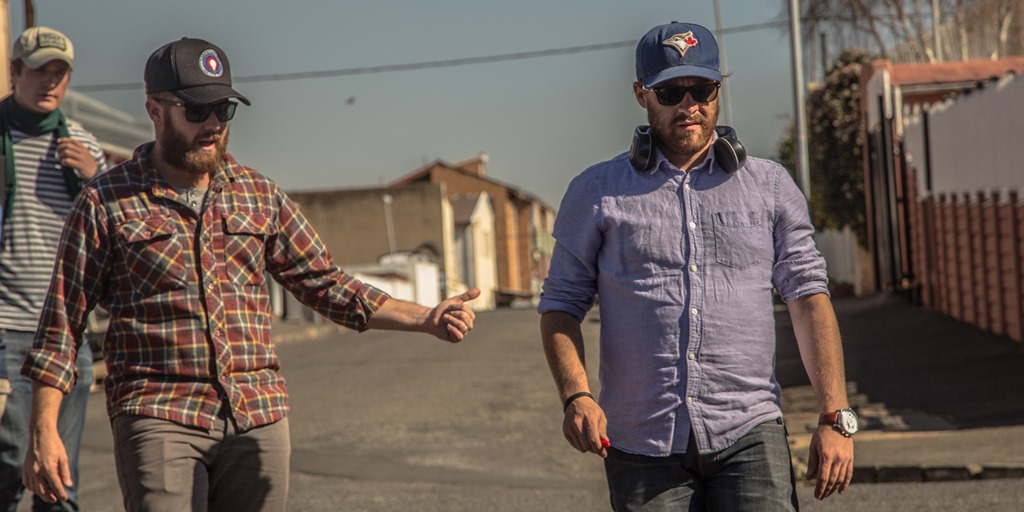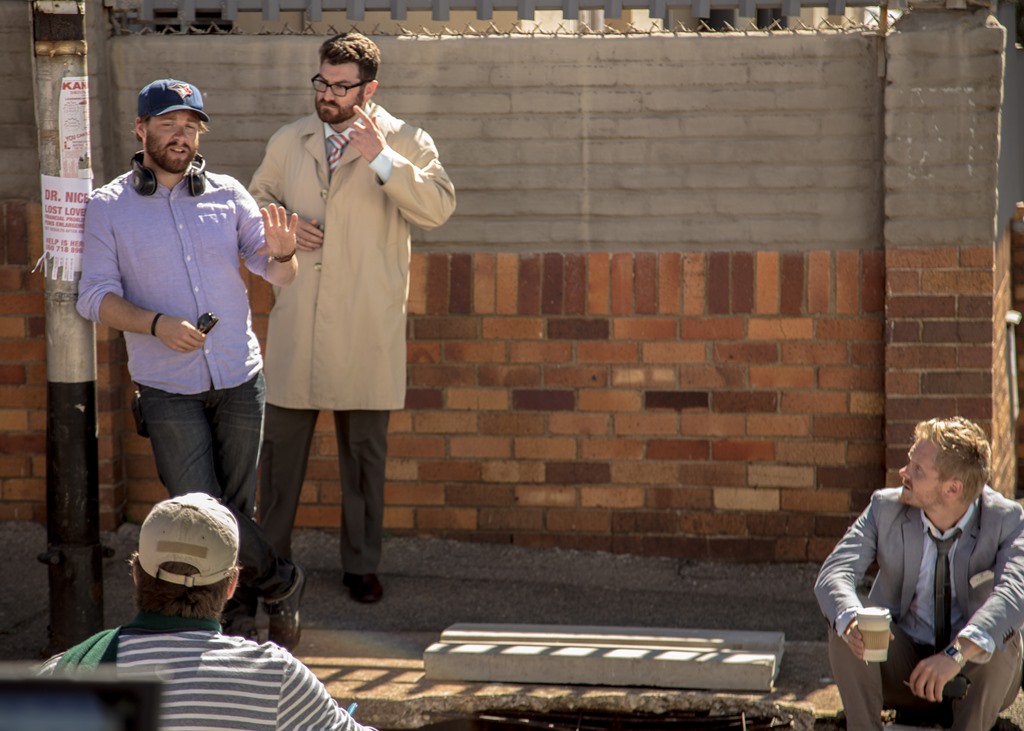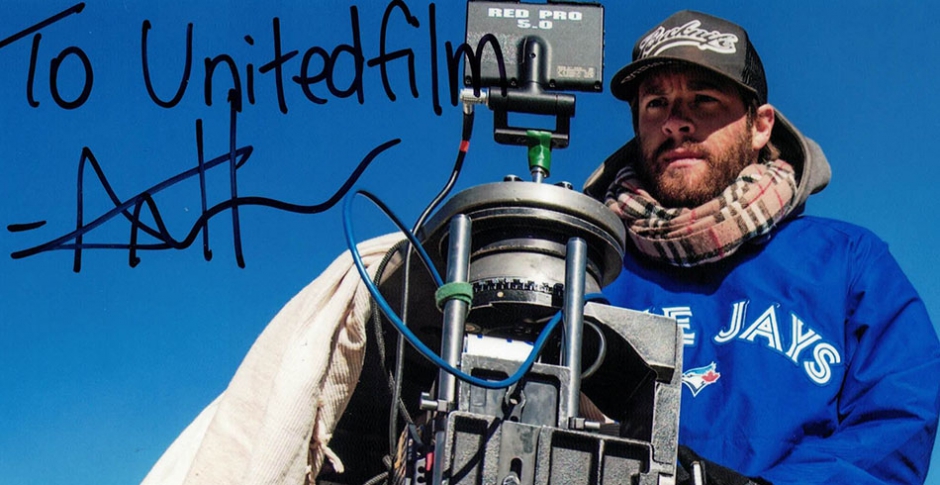Andrew Holmes: Cameras have fascinated me and I always loved creating images
Written by Eva Csölleová, Vítek FormánekAndrew Holmes is Canadian filmmaker who we were recommended by another director from country of Maple Leaf Jesse James Miller.It took some time since Mr. Holmes was shooting film but worth waiting for since his story is just incredible.
 Was work in film business something you dreamt and aimed for since your childhood and led your steps consciously that direction? If not what was that trigger moment that changed your mind that way?
Was work in film business something you dreamt and aimed for since your childhood and led your steps consciously that direction? If not what was that trigger moment that changed your mind that way?
That story starts back in 1995, I was in elementary school and the library had a VHS camcorder that students could check out and use – I have no idea why they had it, but I took it home, unpacked it and was fascinated with the whole thing. I remember hitting record on the camera, pressing and holding the built in ‘FADE’ function, then running around a corner of my parents house, walk into frame and begin to “act" in front of the camera before the fade would full execute - I didn’t know what I was doing, but I was hooked – in 1997, the Junior Highschool I attended launched a film studies class called Video Production, being that I loved Drama and acting, the teachers asked if I would be interested in taking the film class. I think I took that film class two, maybe three, times a school year until I graduated. I knew I wanted to tell stories for a living, I just didn’t know how I was going to do. I am happy to be chasing my dream now.
We spotted your name as writer, camera operator, producer, actor, director. Did you learn the trade as the years and work gone by and became very versatile or couldn´t make up your mind what you wanna be and tried various trades and now can do all by yourself?
For a while there I always considered myself as a bit of a jack-of-all-trades but master-of-none, but after A Mother’s Nightmare it was pretty clear to me that I wanted to direct films. Before AMN, there was some thoughts about being a cinematographer. My background in corporate videos gave me a little camera experience, and I bought my own DSLR that let me practice shooting on my own time. Cameras have always fascinated me, and I always loved creating images with them. This lead to shooting on a bunch of different documentaries which is a great way to travel and get paid to do so. High school film classes taught me the basics, and every single thing from that point on was trial by error.
I’ve also had the chance to produce on some films, which I believe is incredibly important to the little success I have found. If you look at any of the great films from the past decade, most of them are produced by the film’s director in some fashion. I want to tell my own stories, and I know that with how competitive the industry is now, my only chance to tell the stories that I write is by creating that opportunity for myself. I’ve dug my nose into as many funding sources possible and have tried to make myself valuable to other filmmakers.
What do you think is better way to become film director.:Attend film school and learn the trade or visit studio, watch director in action, pick up infos as a sponge and learn REALLY important things „ live“ and jump school years?
Every single person I have spoke to who has gone to film school has wished they hadn’t wasted their money on it - I also spoke to these people on films sets where they are working on a show that paid fairly well, which they may not have had if they didn’t go to school.
I took an director’s assistant job that gave me insight that very few people ever get, and I feel very fortunate about that. I think that before someone tries to direct a film, they should understand thoroughly how films are made, the process is very important. You need to know exactly what you want, and there isn’t a lot of time to make those decisions. The more you know how films are made, the easier it gets to make the tough decisions - which are usually all based around time, and how to preserve the little amount you have. You can learn this by spending time on films sets as a PA, background actor, or any other job on set for that matter. I believe to be good at directing films one needs to understand how to collaborate extremely well, and I’m guessing this could be learned in film school.
The internet is also incredible. Like it’s almost stupid how fantastic it is, everything you need to learn the basics is on there. A person can stream documentaries on film production, watch basically every movie ever made, read film scripts, listen to cast/crew interviews and access film blogs like nofilmschool.com, which I religiously visit. I think that if someone really wants to direct films, they should start by just doing it. Make films, make short films with your friends. Put them on YouTube and share them with everyone who will watch it - listen to what they have to say, really listen, and learn how to take notes. Each film will get easier to make then the next, apply the lessons learned on one of them to the next. Make the films a little bigger each time and try to do something different.
Canadian filmmakers receive incredible amount of support from our government
Was it easy in Canada to start making films? Did you apply for some job to start with and get some credits under your belt or you knew somehow who opened door for you in some studio?Did you intend to work only in Canada or if a chance to go to US arose, you would have gone?
Well, like I said before, my introduction was not very smooth - Vancouver wasn’t very busy in 2011/2012, but I happened to turn a little luck into opportunities with a little hard work. That being said Canada is an incredible place to make films, Vancouver specially. There are a lot of very talented actors and filmmakers here who all support each other. Canadian filmmakers also receive an incredible amount of support from our government - provincial and federal tax credits, the Canadian Media Fund as well as over a dozen broadcaster and film funds. My first feature film was financed by a gentleman that I coached High School football with, and with the lessons I learned producing and directing that film will help make my next film with a bigger budget. Vancouver and the people here have been very good to me, and I would like to film a lot movies here, this being said I would head south to the United States for work as well, just as long as I can come back to Vancouver when the job is done.

Tell us about your period in Sepia Films.Who run the company and what have you done there?And for how long?What have you learn there?Did you ask to do different positions or it was normal practice that people rotate to learn everything there?
After a few movies at Sepia, I transitioned into a production associate / associate producer role. Tina Pehme and her producing partner, Kim Roberts, gave all of us employees the opportunity to do whatever interested us while they had a project in production. I gravitated to on-set work and always took every opportunity that presented itself - Tina and Kim created a ‘Unit Liaison’ roll for me, where I would basically take care of anything that needed to be done. I worked for Sepia for just short of three years, I travelled all over North America, Europe and Africa with them and couldn’t be more happy about my time with them. Last January Sepia brought me back to work for them on their TV movie Perfect High, which shot on Vancouver Island and was a lot fun to work on.
When came the point you knew you can direct a feature movie? Do you have to get certain knowledge to build confidence or you feel you can do it cos that is what you have been aiming for?Do you think if director-to be- hesitates with this step for too long, he will LOOSE confidence in himself and actually never makes a film?
I felt confident enough to direct a film in 2014 - this confidence all came through work experience leading up to that point. There are obviously are a lot of things I have to learn, but on a small scale I knew I could handle basically every situation. Austin Andrews approached me to co-direct a film with him and jumped at the opportunity. Austin is an amazing editor, and has more film knowledge than anyone else I know. My on-set and production experience and his knowledge lead to a great collaboration. In life, if a person wants to do something bad enough, they will do it. Whether it is directing a film, or opening a small business - doing something that very few find success at is scary, but if you focus all your energy and time at it, it will happen.
I think it’s important to focus on what you want, and go for it - you’re wasting your time by doing anything else. Confidence can be cheated; if you are prepared enough, you can convince yourself that you are capable to execute your plan, no matter how impossible. At that point you’ll have the confidence to convince others that you are confident in yourself; that just may be how I define confidence.
I want to tell stories driven by unique characters that don´t get attention in mainstream.
 What made you to film your debut feature film in South Africa, costs or practical reasons like unknown territory that suited your story better? What was it like to film in Johannesburg, did you hire crew there?
What made you to film your debut feature film in South Africa, costs or practical reasons like unknown territory that suited your story better? What was it like to film in Johannesburg, did you hire crew there?
When we were deciding whether to shoot in Vancouver or Johannesburg we asked ourselves what does the location do to further the story. Lord Jones is Dead is about 3 journalists trying to cover a story for a newspaper - Johannesburg still relies very heavily on print media so it just made sense story wise. Once the location scout turned back incredible results, we immediately chose to shoot there. Johannesburg has incredible films crews to work with - my co-director Austin Andrews, our star Chad Krowchuk and myself were the only Canadians on set, every one else was a local hire.
What kind of movies would you like to make in the future-some social issues that personally touches you, some unusual stories that have no potential for box office success but artistically are great or something where you can hit everyone taste, makes yourself known and rich?
I want to tell stories driven by unique characters that don’t see a lot of attention in mainstream media. Don’t get me wrong, I want to make a film about a bad-ass undercover cop one day, but I also want to tell the story of the guy who turned Propaganda into Public Relations. I think every film has potential to become a financial success; it is just figuring out what those successes look like and having realistic expectations. Would I love $100 Million to shoot a film one day? Yes of course! But for now I will put one foot in front of the other and try to tell stories I find interesting on a budget level that I can reach.
When you make your first film and not many people knows you, do you find it hard to sell it, get it onto festivals and into movies. What are your ways how to break into market?
It’s incredibly tough to sell a film when no one knows you, or knows anyone acting in your film. The festival market does helps, but it seems like the big festivals don’t want to take chances on films that don’t feature some sort of star actor. I think utilizing an online release strategy along with a VOD premiere could be the best way to break into the sales market. I think companies like Amazon have it figured out with their current platform, they will be so important to keeping independent film making alive.
Do you have your own production company where you work with same crew or you just hire anybody available and work for anybody who gives you money?
I don’t own a company, I work for several other productions companies to pay my bills and when it comes down to my own projects it’s a case by case scenario. I collaborate a lot with Adam Scorgie at ScoreG Productions, Jesse James Miller at Profile Films and my co-directing partner at Flicker Theory. When we go into production we try to hire the same crew each time, but the team eventually looks different by the time you go to camera.
Now some films are downloaded day after its premiere. Do you think current trend can actually kill cinema as a medium and can kill many studios who will loose their earnings and big festivals premieres will become obsolete and not needed?
I think each project should be handled individually. If a film premieres it is usually at a film festival, and it might not even be the finished version of the film, it also probably won’t see a theatrical release for quite a while. I don’t think any movie should be available for download until the project is out of theatres, personally - this keeps piracy to a minimum and will help the theatrical numbers. That being said, a movie the size of Lord Jones is Dead will only live online after we premiere, and I hope that strategy works for us.


